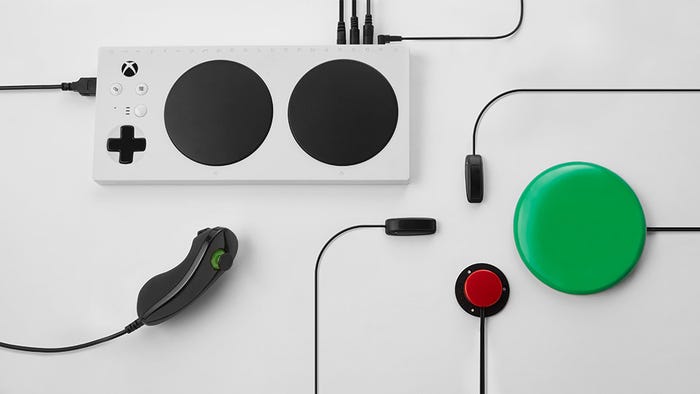Trending
Opinion: How will Project 2025 impact game developers?
The Heritage Foundation's manifesto for the possible next administration could do great harm to many, including large portions of the game development community.

Gamescom 2024 | Read more Gamescom coverage from the Game Developer team right here, including interviews from the show, analysis of leading developer trends, and more.
Xbox senior accessibility product manager Kaitlyn Jones and principal designer Chris Kujawski explain how the company is working to make video games accessible to all.

Around six years ago, Xbox took a leap of faith. The company unveiled the Xbox Adaptive Controller, a new type of gamepad that defied traditional design conventions in service of a singular mission: make video games accessible to all.
The console maker has devoted itself to that goal in the subsequent years, rolling out new accessibility options for its video game software, bringing external developers into the fold so they can test their own accessibility features, waiving the licensing fee for accessible hardware developed through its 'Designed for Xbox' program, and building entirely new devices such as the Xbox Adaptive Joystick.
Discussing those initiatives with Game Developer at Gamescom 2024, Xbox senior accessibility product manager Kaitlyn Jones and principal designer Chris Kujawski explain the benefits of accessible design—whether you're talking about hardware of software—are profound but can often be easy to miss.
"We define accessibility as 'ensuring that anybody who wants to be able to use or play can do so.' It can mean a lot of different things [...] so it does vary, but our general philosophy is that a 'rising tide floats all boats.' When it comes to accessibility, we don't compete. We just want anyone to play regardless of the title or platform," says Jones.
In practice, Microsoft applies that philosophy by working directly with disabled players. Kujawski explains there's a saying within that community: "nothing about us, without us." That, he says, influences every decision Xbox makes.
It's why, for example, the company took a myriad of Xbox Adaptive Joystick prototypes to a hospital in Seattle so they could be put through the wringer. The team have to understand use-cases that might not be immediately apparent. In this instance, that testing slalom highlighted the need for the Joystick to be mountable on solid surfaces, allowing it to be used by people who might not be able to hold it in their hand.
"We are not designing something and then handing it over," adds Kujawski. "It's a co-design process. So throughout the process there are many different checkpoints and many different departments—whether that's individuals or charities or hospitals.
"The team has built a huge network where folks can get feedback from, so that's a very core part of the design process. In addition to that, the halo effect [of our work] has meant that accessibility has become a part of our game design process. We don't make products now without doing an accessibility check."
Those checks means Xbox now strives to make everything down to the cardboard boxes that house its consoles accessible. No detail is too small, and no compromise is too big.

The Xbox Adaptive Controller debuted in 2018
That wasn't always the case. Kujawski explains each new accessibility concept has to be pitched up the chain. The team has a fluctuating roadmap of products that are "always competing for space," and will often cook up experimental 'proof-of-concept' projects before entering the pitching room.
"[Pitching] has gotten easier since the Adaptive Controller," says Kujawski. "There's more of a pull. [The Adaptive Controller] wasn't a hard sell, necessarily, but there was a lot of explaining to do. Because leadership gets pitched ideas all of the time, so at the beginning it's just one of many. But because of the unique nature of [our projects] and the match to Microsoft's mission, it has become easier."
Jones adds there's now a "better understanding" internally about how accessibility can have a positive impact on an entire playerbase. "For example, our co-pilot feature, [now called] 'Xbox Controller Assist,' was pitched to leadership as something that would allow a parent and a child that was just learning to game to be able to play together," she continues. "Now we know it's also a really fantastic accessibility feature, so I think discussing those alternative use cases that just make experiences more viable for anyone is really important."
Notably, Jones says there's never any pressure on the accessibility team to "sell a certain number of units," although pricing is very much a consideration. "What we do want to do is ensure that product is as low cost as possible," she adds. For example, in a bid to keep costs down for consumers, Xbox chose to make its Adaptive Joystick wired instead of wireless.
"[That way] we don't have to pay for battery," says Kujawski. "It also makes it lighter. There have been other joysticks on the market like this, that are hardwired to USB. With those, you have one length of cable. We ship with a two meter cable but we made it removable on purpose, so if you're playing right next to the Xbox Adaptive Controller you can switch that out. We're always making those trade-off and asking 'what gives us the most flexibility, what helps us with cost, and what expands the reach of the products?'"
Building products that are accessible, flexible, and affordable is evidently paramount. But what about products that last? Kujawski reiterates that Xbox is in this for the long haul. That means it won't be refreshing its slate of accessibility hardware on a whim. These are devices built to transcend console generations (and whatever comes beyond). "We would definitely get a lot of negative feedback if, say next generation, this [device roster] doesn't work," he adds. "That's a real bad look and it's just a bad policy. The longevity of it is super important."
You can learn more about Xbox's range of accessibility tools and hardware on Xbox Wire.
You May Also Like